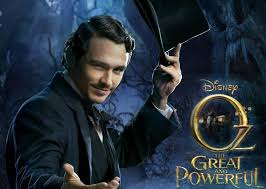Watch “Star Trek” Free on Hulu This Week
Posted on March 26, 2013 at 4:45 pm
The original “Star Trek” series is free on Hulu this week and Slate has a great list of the essential episodes everyone needs to see.
But — what, no tribbles?
Posted on March 26, 2013 at 4:45 pm
The original “Star Trek” series is free on Hulu this week and Slate has a great list of the essential episodes everyone needs to see.
But — what, no tribbles?
Posted on March 9, 2013 at 8:00 am
Bindi Irwin, the 14-year-old daughter of wildlife enthusiast Steve Irwin, stars in “Return to Nim’s Island,” a Hallmark Channel Original Movie World Premiere on Friday, March 15 (8 p.m. ET/PT, 7C).
“Return to Nim’s Island” kicks off Hallmark Channel’s new Walden Family Theater, created by Walmart, P&G, Walden Media and ARC Entertainment. “Return to Nim’s Island” is based on the novel Nim at Sea by Australian author Wendy Orr and is the sequel to the 2008 action-adventure international box office hit “Nim’s Island.” In “Return to Nim’s Island,” Nim (Irwin) and her father Jack (Matthew Lillard; “The Descendants,” “Scream”) discover that greedy resort developers plan to buy their beloved Nim’s Island and turn it into a tourist destination, endangering the local wildlife. So Nim takes it upon herself to recruit some animal allies in her battle against the forces who care more about profitability than morality. One of her assistants includes Selkie, a savvy sea lion and Nim’s best pal. Selkie winds up getting kidnapped by a fisherman and his sons (John Waters, Sebastian Gregory, Jack Pearson) who intend to sell her. Nim realizes she can’t depend on her animal cohorts alone and relies on her first human friend, Edmund (Toby Wallace), to help save her home. Along with Jack’s intern, Felix (Nathan Derrick), Nim and Edmund work together and try to defeat the developers and save the beloved island and its endangered species.
Posted on March 7, 2013 at 6:00 pm
B+| Lowest Recommended Age: | 4th - 6th Grades |
| MPAA Rating: | Rated PG for sequences of action and scary images and brief mild language |
| Profanity: | Brief mild language |
| Alcohol/ Drugs: | None |
| Violence/ Scariness: | Fantasy action/peril/violence, scenes of desolation and loss, scary monsters and jump out at you surprises, some disturbing images |
| Diversity Issues: | Diverse characters |
| Date Released to Theaters: | March 8, 2013 |
| Date Released to DVD: | June 10, 2013 |
| Amazon.com ASIN: | B00C7JG0KG |
 A prequel to one of the most beloved films of all time is a daunting challenge, but Disney’s prequel to “The Wizard of Oz” manages to balance respect for the original with some fresh and appealing insights into the story. But the real star of the story is the enchanting, rapturously imagined setting, brilliantly designed by Bob Murawski and directed by Sam Raimi. From the captivating opening credit puppet theater, we are immediately in the world of magic and mystery — and hokum.
A prequel to one of the most beloved films of all time is a daunting challenge, but Disney’s prequel to “The Wizard of Oz” manages to balance respect for the original with some fresh and appealing insights into the story. But the real star of the story is the enchanting, rapturously imagined setting, brilliantly designed by Bob Murawski and directed by Sam Raimi. From the captivating opening credit puppet theater, we are immediately in the world of magic and mystery — and hokum.
Like the 1939 Judy Garland classic, the movie opens in black-and-white. The screen is shrunken to the proportions of the 1930’s. And, like the Garland version (but not the books), the characters and themes of Oz are echoed in the scenes set back home. Oscar Zoroaster Phadrig Isaac Norman Henkel Emmannuel Ambroise Diggs, known as Oz for his first two initials, is a showman and a con man, a magician in a small traveling circus. Personally and professionally, his life is about fooling as many people as possible. He is constantly either trying to impress a pretty girl or trying to avoid any personal entanglements, romantic or friendship.
It is telling that his big trick is to select a pre-arranged “country girl” from the audience apparently at random, making her seem to float in the air, and then wait for the viewers to think they’ve figured out the trick by noticing the wires that appear to keep her suspended. This makes possible the dramatic flourish — he cuts the wires to reveal that he has not just made her float — he has made her disappear. Oz is eternally poised on the brink between reality and illusion, between connection and distance, between appearing (no one is more visible than those whose profession is to perform in public) and disappearing (he always seems to have a means of escape handy). At the same time, the “country girl” is discovering that he lied to her, the circus strong man is coming after him for flirting with his wife, and he receives a visit from the only woman we sense he has ever really cared for (Michelle Williams), who asks him if there is any reason she should turn down a proposal from another man. He tells her to accept, though it is clear that he has some regrets. And then, he does what he does best — he escapes, jumping into the circus hot air balloon, which is whipped into a twister, and which deposits him in a strange and wondrous land of lush and vivid color — Oz.
 The first creatures he meets are nasty little water fairies with big teeth and a stunningly beautiful woman with a splendid brimmed hat named Theodora (Mila Kunis). She seems to think that he is the wizard from a prophecy — a man with the same name as their enchanted land, who would arrive to rule as king and free their people. Freeing the people does not have much appeal for Oz, but he is definitely intrigued by the notion of a palace, a throne, and a scepter. “Is the scepter made of gold?” he asks, to make sure that this deal is as sweet as it sounds.
The first creatures he meets are nasty little water fairies with big teeth and a stunningly beautiful woman with a splendid brimmed hat named Theodora (Mila Kunis). She seems to think that he is the wizard from a prophecy — a man with the same name as their enchanted land, who would arrive to rule as king and free their people. Freeing the people does not have much appeal for Oz, but he is definitely intrigued by the notion of a palace, a throne, and a scepter. “Is the scepter made of gold?” he asks, to make sure that this deal is as sweet as it sounds.
We know that Oz will be come the wizard and live in the palace. We know he will become “a good man but a bad wizard,” hiding behind the curtain as he works the controls of a huge face with a booming voice. We know he will bestow gifts that show people the greatness that is already within them. And we know he will have to take a journey to get there. Writers Mitchell Kapner and Pulitzer Prize awardee David Lindsay-Abaire (“Rabbit Hole“) weave in characters and themes inspired by some of the other Oz books as well, including a girl made out of porcelain, rescued from her shattered “China Town.” Oz meets up with two other witches as well, including one who has a very bad reaction to moisture. And he is not the only one who has to decide which side he will be on.
The visuals are fabulously imaginative, consistently surprising and new and yet consistent with our ideas about Oz from the books and the 1939 film. That’s consistent but not identical — Disney had to be careful not to get too close to MGM’s copyrighted designs. So there are flying monkeys, but very different (and even scarier), a poppy field, and an Emerald City gatekeeper (who will be familiar to fans of Sam Raimi’s less family-friendly films). The 3d effects are effective, especially during the twister. Franco’s characterization wavers at times and he never quite persuades us that he is at heart a showman. The big reveal about what prompts a witch to turn evil is disappointingly under-imagined. Indeed, for a movie with three significant female characters played by three of Hollywood’s most talented women and the China Girl (voiced by Joey King), the film’s conception of women is unfortunately superficial, simplistic, and male-oriented. It is an enchanting journey — but at the end you may wish to click your heels three times to return to the peerless Garland version and the books. There’s no place like home.
Parents should know that this film includes extended fantasy peril, action, and violence, with scenes of devastation and loss, jump out at you surprises, and scary monsters, some disturbing images, brief mild language, a character who makes advances at many women, and scenes of jealousy, anger, and sadness.
Family discussion: What is the difference between being a great and a good person? Why did Glinda believe in Oz? How did the characters in the prologue relate to their counterparts in Oz? What elements of the classic Oz story are explained in this film?
If you like this, try: the Oz books by L. Frank Baum, and the classic film with Judy Garland
Posted on February 13, 2013 at 6:00 pm
 Chases. Explosions. Guns. Crashes. Wisecracks. Punches. Repeat. Repeat again. Yes, it’s the fifth “Die Hard” movie.
Chases. Explosions. Guns. Crashes. Wisecracks. Punches. Repeat. Repeat again. Yes, it’s the fifth “Die Hard” movie.
Bruce Willis returns as cop John McClane and this time the setting is Moscow. Though he repeatedly says throughout the film’s zippy 90 minutes that he is on vacation, McClane is in Russia to help his estranged son Jack (Australian actor Jai Courtney of “Spartacus”), who has been arrested for attempted murder. It turns out that Jack, who uses his mother’s last name and has not spoken to John in years, is actually under cover for the CIA. Both the Russians and the Americans want a “file” that has been hidden away by a man named Komorov (Sebastian Koch), who is about to go on trial. It contains incriminating information about a high-ranking Russian official. He wants it destroyed. The Americans want to use it to discredit him. The stakes are very high. The chases are very fast. The explosions are very big. The repartee is….not great, but thankfully minimal.
Unlike his “Expendables” colleagues Arnold Schwarzenegger and Sylvester Stallone, whose 2013 action film releases managed to be both lackluster and overheated, with so much work done on their faces they looked like bad copies of Madame Tussaud’s replicas of themselves, Willis is every bit as good and better than he was in the first “Die Hard” film a quarter century ago. Regrettably, we get only a glimpse of the fabulous Mary Elizabeth Winstead, briefly returning as John’s daughter, Lucy, to drop him at the airport and admonish him to behave (as if!). But Courtney is well-matched to Willis, with their bullet heads, truculent glares, and cocky pleasure in their own outrageous badassery. John may pause for a brief “Cat’s in the Cradle” reverie with Komorov in between dodging bullets, as they ruefully reflect on their failures as fathers, but shortly afterward, as John and Jack awkwardly observe a tender parent-child reunion, they agree that nothing like that would work for them. “We’re not a hugging family,” Jack says. “Damn straight,” agrees his father.
The locations are exotic, and the chase scene through the streets of Moscow is wilder than any since the last “Die Hard.” The titles may be getting increasingly labored but Willis and the stunts make it work.
Parents should know that this film has constant peril and violence. Many characters are injured and killed, and there is a lot of shooting, punching, chases and explosions, some graphic and disturbing images, and strong language.
Family discussion: How are John and Jack alike? Why was Jack so angry with John? What changed his mind?
If you like this, try: the other “Die Hard” movies, especially the first and third
Posted on January 21, 2013 at 8:00 am
What could be more fun than the first “Red?” Putting the band back together and adding Sir Anthony Hopkins!